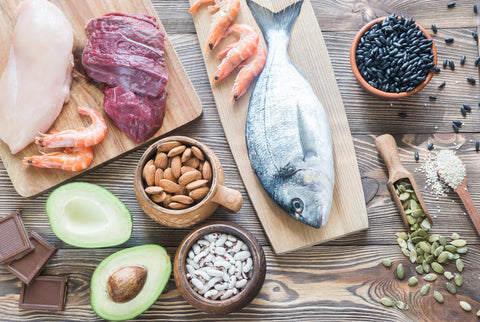The mineral selenium is named after the Greek moon goddess Selene who, according to myth, had more than fifty children. In a narrow window between toxic dose and approximate daily requirement lies our intake of selenium, whose importance for health was first noticed by veterinarians. But why is this small dose of the trace mineral so important to us?
Selenium for healthy and young cells
The enzyme glutathione peroxidase literally puts out fires in our cells. Selenium is required when reactive radicals formed in the body's processes are to be eliminated so that they do not become harmful.
Reactive oxygen radicals are formed both by the body's normal metabolism but also by environmental toxins and toxins from the outside. If there is not enough selenium for the glutathione processes, the enzymes cannot do their job. The results of that will be, among other things:
- (premature) aging
- chronic inflammatory conditions (many different diseases)
- dark pigmentation of skin and other tissues with lipofuscin.
Which genes you have can affect the need for selenium. If you are exposed to environmental toxins, exhaust gases, solvents or other chemical agents, selenium can protect against toxic effects.
The eye and vision
Selenium, together with other nutrients such as lutein and vitamin E, are particularly valuable in protecting the eye from the peroxidation that can deteriorate vision over time.
The thyroid gland
Thyroid hormones need several key nutrients to function in the body. One of them is selenium, which is part of an enzyme that converts thyroxine (T4) into triiodothyronine (T3). T3 is the form of thyroid hormone the body uses the most.
Many people know that we need iodine for the thyroid gland to function well. But if we don't have enough selenium, the extra iodine we take can be too stimulating and even inflammatory and harmful. So make sure to saturate yourself with selenium before and at the same time as you take extra iodine.
Growth and reproduction
Selenium is necessary for
- many healthy and motile sperm cells
- normal production of testosterone
- a healthy pregnancy
- puberty development in boys.
A Mexican study has shown that testicular volume and the amount of pubic hair decreased in boys with too low a selenium intake.
Selenium can increase levels of the growth factor IGF-1 which promotes development during puberty.
A study of elderly Swedes revealed that IGF-1 and pituitary hormones increased in those who received selenium supplementation compared to those who received a placebo.
Selenium deficiency can contribute to:
- miscarriage
- preeclampsia
- delayed fetal development
A good selenium status is also required to prevent premature birth, gestational diabetes and obstructed bile flow during pregnancy.
Cancer
Selenium protects against cancer by:
- reduce chromosomal damage
- repair DNA
- balance cell division rate.
A balanced intake of selenium protects against breast cancer. Selenium deficiency combined with low levels of vitamin E is associated with increased cases of lung, skin and gastrointestinal cancer.
Immune defense
Keshan's disease, which mainly affects the heart muscle of children and young people, was discovered in an area of China where the soils have extremely low levels of selenium. At first, it was believed that the disease was directly caused by selenium deficiency, because those who were given selenium were protected against heart damage. Then it was discovered that the people with Keshan's disease were infected with a Coxsackie virus.
More recently, many people have discovered the benefits of taking selenium not only for detoxification, cancer prevention or thyroid hormones, but also for improving the immune system. Selenium together with vitamin E enhances the production of antibodies.
Sources of selenium
Shellfish, fish, meat, poultry, offal, egg yolk, nuts. Vegetables generally have low levels of selenium except garlic and asparagus.
But how much selenium a food contains depends on the content in the soil where the crop or fodder was grown or the animals grazed. Therefore, the content can vary greatly depending on the country or region.
Curious:
Research is underway in different parts of the world on how to make crops richer in selenium. One of them is to strengthen the soil with microbes that can make plants increase their uptake and turnover of selenium.




